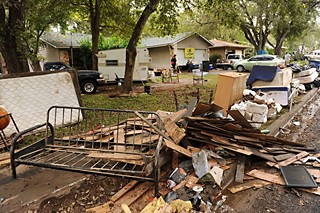Then There's This: High and Dry
When it rains it pours, but the drought doesn't budge an inch
By Amy Smith, Fri., Nov. 15, 2013
The odd weather events of these past couple of months have created a peculiar juxtaposition for various local officials, one segment of whom is immersed in flood relief efforts while another is issuing dire warnings of an accelerating drought.
Add the upcoming statewide campaign races to the water-and-politics mix and you've got an even stranger brew. Earlier this week, the Texas Tribune touted a heavily circulated story about GOP gubernatorial candidate Attorney General Greg Abbott, along with an assortment of other wealthy Austinites, tapping into the Edwards Aquifer to water their lawns and fill their swimming pools. The Statesman countered with an online response, pointing out that the daily first reported on the water well trend in 2012, and in fact had quoted Abbott's defense that it was better to drain the aquifer than the municipal water supply. All things being equal, we had to stick our nose in to note that we were the first to jump on the story, way back in July 2011 (see "The Law(ns) of the Land," July 15, 2011). It also happened that we were already working on a well-drilling update for this week's issue, which you can read about here. Added bonus: a map!
Anyway, if you're still with me you might be wondering what the point is in arguing about who was the first to write about rich folks' answer to water shortages, when hundreds of people are still trying to regain their footing after the deadly Halloween rains that flooded Onion Creek and ravaged neighborhoods. And when we're entering an even greater severity of drought, even after two whopping rainstorms in October, who cares about who was first to report that only the very rich can afford to keep their landscapes healthy?
Back to the mundane, last week, Austin Water's Daryl Slusher, an assistant director over conservation programs, appeared before the Environmental Board with a double whammy: The drought is so bad, he said, that the utility may be forced to place further restrictions on its once-weekly outdoor watering schedule, while also raising water rates to keep the utility afloat. The news was somewhat similar to what Utility Director Greg Meszaros delivered to Council in early October (see "Point Austin: When the Well Runs Dry," Oct. 11), but Slusher's update included the impact – or lack thereof – of the recent rains. He illustrated his point with a slide showing area rainfall totals produced by the Oct. 31 storm: nine inches where most of the flood damage occurred in Southeast Austin, and five inches Downtown. But to the west, where rainfall totals have the most lasting effect, meteorologists recorded about a tenth of an inch, creating barely a ripple in the area water supply reservoirs of Lake Travis and Lake Buchanan.
"These are the lowest 10 years of inflow into the lakes since 1942," Slusher told the board. If dry conditions continue as expected, the water utility would move from the current Stage 2 drought conditions, to Stage 3, which would trim the number of hours allowed for your once-a-week irrigating. Stage 4, if it comes to that, would restrict outdoor watering altogether, although some hand-watering would be allowed to protect plants and trees.
Slusher also alluded to the city's historically strained relationship with the Lower Colorado River Authority, specifically its controversial policy of releasing water to rice farmers downstream. "If there was a more rational or cautious approach to the agricultural releases, then we wouldn't be in that kind of situation. ... That's part of having a water management plan that wouldn't make that same mistake again," he said.
Meanwhile, the LCRA goes before its board Tuesday to seek emergency drought relief in 2014, which would cut water to downstream farmers if the water in lakes Travis and Buchanan is below 1.1 million acre-feet on March 1. Also, LCRA said it would, for the first time (but not a moment too soon) require its residential and business customers to reduce watering to once a week if the lakes' combined storage falls below that level.
Somehow this proposed emergency plan, which the LCRA announced Wednesday, doesn't inspire a lot of confidence about the agency's ability to handle the crises at hand. The LCRA does, after all, report to the state, whose leadership is still in denial about global warming.
Rather than planning for a future based on current climate trends, the river authority is looking to history for the answer. As environmental engineer Lauren Ross observes, "The LCRA has all of these management plans with the [Texas Commission on Environmental Quality], and all it does is tell us when we turn the floodgates on, when we tell people to conserve – that's all based on the historical records and the drought of record," she said. "So when you start bringing in all of those historical records that are not valid anymore, then your complete foundation for managing water is gone. It's gone."
By that point, it won't matter who'll be the first to report it.
Got something to say on the subject? Send a letter to the editor.










